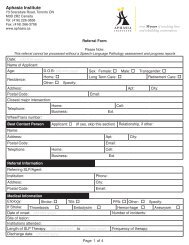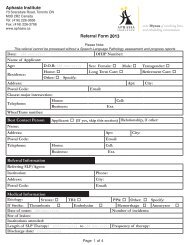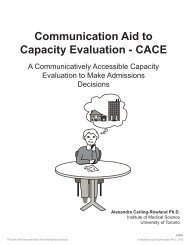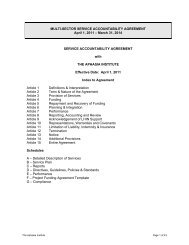SLP Survey Report_Final - Aphasia Institute
SLP Survey Report_Final - Aphasia Institute
SLP Survey Report_Final - Aphasia Institute
You also want an ePaper? Increase the reach of your titles
YUMPU automatically turns print PDFs into web optimized ePapers that Google loves.
living)<br />
• Regular schedule of in servicing to Nursing and Allied Health staff 2. Regular schedule of<br />
<strong>SLP</strong> service development meetings<br />
• Integrated services between in and outpatient programs<br />
• More community based aphasia centers. More adult AAC clinics<br />
• ACCESS TO WIFI for persons with aphasia living in nursing homes ACCESS T0<br />
COMPUTERS/IPADS FOR persons with aphasia to use-- for self-practice<br />
ENCOURAGES FAMILY INTERACTIONS WITH residents<br />
• More professional development and ongoing training to stay up to date, more time<br />
allocated to this population (i.e. need for more S-LP's)<br />
• Wide identification and dissemination of Best Practices Best practices specific to treatment<br />
setting and acuity Creative integration of <strong>SLP</strong> goals into other discipline's therapy<br />
Staffing<br />
• Increase <strong>SLP</strong> staffing Increase support staff Education time off Access to IT programs<br />
Increase community resources<br />
• Adequate staffing; respect for professional expertise of <strong>SLP</strong>s; team support for promotion<br />
of communication opportunities for patients in all aspects of care; better understanding by<br />
physicians of communication impairments and treatments; intelligent management<br />
• <strong>SLP</strong> staffing has been adjusted over the years to accommodate dysphagia needs and not<br />
communication; <strong>SLP</strong> staffing needs to reflect that communication intervention is valued.<br />
• We are currently short staffed with positions being frozen due to budget cuts. Therefore we<br />
are really limited in resources<br />
Other<br />
• An attitude shift in management that puts more emphasis on quality and less emphasis on<br />
making excel spreadsheets look pretty in terms of "number of admits" and "number of<br />
discharges"<br />
• Better access to the evidence (hospital does not have access to Medline)<br />
• More evidence validating French tests and therapy material<br />
• More support in French<br />
• Decreased workload More FTE More Communication Disorder Technicians<br />
• Having a designated stroke unit would enable opportunity to use evidence-based practices;<br />
• not so much access to evidence but paucity of evidence in the field - access to new, updated<br />
materials - interdisciplinary goal setting (participation level) - link to research partners to<br />
help with translation of research to practice - link to research partners to help organize<br />
therapy into "mini research studies" that could lead to outcomes that are easier to interpret<br />
and replicate and can add to evidence informed practice<br />
• Improved workload relief to allow for time to review evidence. Improved access and<br />
availability for evidence-based practice. More frequent aphasia therapy technique<br />
education/training (e.g. more seminars, courses, conferences). Better ready-to-use therapy<br />
materials.<br />
• More institutional priority put on communication (rather than swallowing!).<br />
<br />
51











